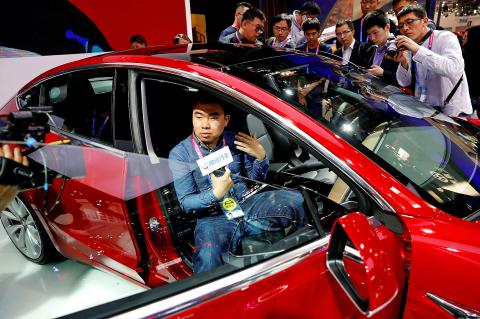Tesla Inc yesterday started taking orders for Model 3 cars to be made in China, lowering prices for the vehicle as it seeks to double down on a market it expects to drive growth and revenue.
The Palo Alto, California-based company set the base price at 328,000 yuan (US$47,523), including value added taxes, it said in a statement.
The sedans, to be built at Tesla’s Gigafactory in Shanghai, are to have a range of 460km per charge and will probably be delivered in six to 10 months. The car is 49,000 yuan cheaper than the imported version.

Photo: Reuters
“The price drop makes Tesla more accessible,” the company said in a Chinese-language statement.
Tesla would introduce V3 Superchargers in China by the end of this year, it said.
The new technology cuts charging times to about 15 minutes, Tesla said in a blog post in March.
Tesla currently ships all its vehicles from the US, making them ineligible for Chinese government subsidies and subjecting them to import tariffs. The company is counting on its Shanghai factory, which is slated to begin production this year, to bolster competitiveness in a country crowded with hundreds of electric-vehicle rivals.
The need for Tesla to expand beyond the US was highlighted by its latest quarterly results, which missed analysts’ projections. The halving of a US federal tax incentive for Tesla purchases starting in January dragged on US demand in the quarter and Tesla struggled to offset that drop by starting deliveries of the Model 3 in Europe and China.
Local production in China, the world’s largest auto market, would not only allow Tesla to avoid import duties amid trade tensions, but also speed up deliveries, a priority flagged by Tesla chief executive officer Elon Musk.
A 31 percent quarter-on-quarter drop in deliveries in the first three months contributed to a 43 percent plunge in Tesla shares this year.
Separately, Tesla tweeted that the Model 3 can now also be ordered in Australia, Hong Kong, Japan, New Zealand, Ireland and Macau.

Taiwan’s rapidly aging population is fueling a sharp increase in homes occupied solely by elderly people, a trend that is reshaping the nation’s housing market and social fabric, real-estate brokers said yesterday. About 850,000 residences were occupied by elderly people in the first quarter, including 655,000 that housed only one resident, the Ministry of the Interior said. The figures have nearly doubled from a decade earlier, Great Home Realty Co (大家房屋) said, as people aged 65 and older now make up 20.8 percent of the population. “The so-called silver tsunami represents more than just a demographic shift — it could fundamentally redefine the

Businesses across the global semiconductor supply chain are bracing themselves for disruptions from an escalating trade war, after China imposed curbs on rare earth mineral exports and the US responded with additional tariffs and restrictions on software sales to the Asian nation. China’s restrictions, the most targeted move yet to limit supplies of rare earth materials, represent the first major attempt by Beijing to exercise long-arm jurisdiction over foreign companies to target the semiconductor industry, threatening to stall the chips powering the artificial intelligence (AI) boom. They prompted US President Donald Trump on Friday to announce that he would impose an additional

China Airlines Ltd (CAL, 中華航空) said it expects peak season effects in the fourth quarter to continue to boost demand for passenger flights and cargo services, after reporting its second-highest-ever September sales on Monday. The carrier said it posted NT$15.88 billion (US$517 million) in consolidated sales last month, trailing only September last year’s NT$16.01 billion. Last month, CAL generated NT$8.77 billion from its passenger flights and NT$5.37 billion from cargo services, it said. In the first nine months of this year, the carrier posted NT$154.93 billion in cumulative sales, up 2.62 percent from a year earlier, marking the second-highest level for the January-September

Asian e-commerce giant Shein’s (希音) decision to set up shop in a historic Parisian department store has ruffled feathers in the fashion capital. Anger has been boiling since Shein announced last week that it would open its first permanent physical store next month at BHV Marais, an iconic building that has stood across from Paris City Hall since 1856. The move prompted some French brands to announce they would leave BHV Marais, but the department store had already been losing tenants over late payments. Aime cosmetics line cofounder Mathilde Lacombe, whose brand was among those that decided to leave following